|
126 |
|
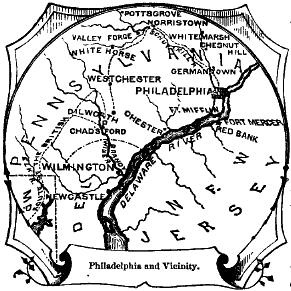 Immediately
after entering Philadelphia, Howe detached part of his force to
capture some forts on the
Immediately
after entering Philadelphia, Howe detached part of his force to
capture some forts on the ![]() Delaware,
which prevented his fleet from coming up the river. Washington
improved the opportunity to attack the British camp at Germantown.
At first victory inclined towards the Americans. Their failure may
be attributed chiefly to inexperience and want of discipline.
Their loss in this battle was nearly twelve hundred men.
Delaware,
which prevented his fleet from coming up the river. Washington
improved the opportunity to attack the British camp at Germantown.
At first victory inclined towards the Americans. Their failure may
be attributed chiefly to inexperience and want of discipline.
Their loss in this battle was nearly twelve hundred men.
17. The force sent
against the defences of the Delaware met with stout resistance.
Count Donop, with twelve hundred Hessians, assaulted Fort
Mercer, at Red Bank, on the Jersey shore, but fell mortally
wounded, and the attack was repulsed with great slaughter. At the
same time several British ships assailed Fort Mifflin, on
an island in the Delaware, but they were obliged to retire -- a
sixty-four being blown up and a frigate burned. In November,
however, the Americans were obliged to evacuate these forts, and
the river was opened to the British
fleet.1
18. The expedition of General
Burgoyne has already been alluded to.2 Burgoyne's
plan was to force his way from Canada to New York, and thus cut
off New England from the other colonies. He left Canada with eight
thousand regulars, besides Canadians and Indians. Passing up Lake
Champlain, he invested Fort Ticonderoga, July 1, then
garrisoned by three thousand men, tinder General St. Clair. St.
Clair abandoned the fort, and, with considerable loss, effected a
junction with General Schuyler,3 the commander of the
northern army', who was then at Fort Edward. The united forces,
numbering not more than five thousand men, retired on the approach
of Burgoyne, and finally took post on the islands at the mouth of
the Mohawk.
1 See p. 129, ¶ 26, and p. 131, ¶ 32. 2 See p. 125, ¶ 14. 3 See p. 117, ¶ 13.
QUESTIONS. -- What more can you tell of the battle at Germantown? 17. What is said of the attack on Fort Mercer? On Fort Mifflin? 18. What was Burgoyne's plan? What fort did he invest? How was the fort garrisoned? What in said of St. Clair? Who was commander of the northern army? Where did he take post?
|
|
127 |
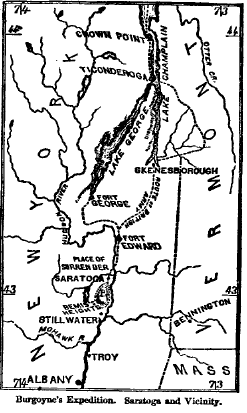 19.
After taking possession of Ticonderoga, Burgoyne immediately sent
forward his gunboats, which overtook and destroyed or captured the
American flotilla near Skenesborough.1 The garrison at
that place set fire to their stores and fled. Burgoyne then pushed
forward with great difficulty to Fort Edward and thence
advanced along the east bank of the Hudson. Finding himself short
of provisions, be despatched Colonel Baum, with a strong force of
regulars, Tories, Canadians, and Indians, to seize some stores at
Bennington, Vermont. This detachment was totally defeated, August
16, by a body of Vermont and New Hampshire militia, under Colonel
Stark.2
19.
After taking possession of Ticonderoga, Burgoyne immediately sent
forward his gunboats, which overtook and destroyed or captured the
American flotilla near Skenesborough.1 The garrison at
that place set fire to their stores and fled. Burgoyne then pushed
forward with great difficulty to Fort Edward and thence
advanced along the east bank of the Hudson. Finding himself short
of provisions, be despatched Colonel Baum, with a strong force of
regulars, Tories, Canadians, and Indians, to seize some stores at
Bennington, Vermont. This detachment was totally defeated, August
16, by a body of Vermont and New Hampshire militia, under Colonel
Stark.2
The loss of the enemy was eight hundred,
in killed, wounded, and captured. Colonel Baum was wounded
mortally. The loss of the Americans was less than one
hundred.
20. Reënforcements were now
gathering to the American camp, and just as General
Schuyler had all things ready to make head against the English
with some prospect of success, he was superseded by General
Gates.3
21. While proceeding up Lake
Champlain, Burgoyne sent Colonel St. Leger, with a detachment,
chiefly of Mohawk Indians, under their chief, Joseph Brant, and of
Canadians, against Fort Schuyler.4 General
Herkimer hastened to its relief; but, falling into an ambush at
Oriskany,
1 Now Whitehall.
2 See p. 114, ¶ 4. Stark was made a brigadier-general for his gallantry on this occasion.
3 Gates did little more than to reap where Schuyler had gown. The latter,though causelessly removed, made a full statement to Gates of all his plans -- a generosity that Gates meanly requited by emitting to invite him to his first council of war.
4 Formerly called Fort Stanwix. It was on the site of Rome New York.
QUESTIONS. -- 19. What more is said of Burgoyne's advance? Describe the battle of Bennington. 20. By whom was Schuyler superseded, and under what circumstances? 21. Describe it. Leger's expedition against Fort Schuyler?
|
128 |
|
he was mortally wounded, and lost four hundred men. The
garrison, however, held St.![]() Leger in check until he heard of the approach of Arnold, who had
been despatched against him, when he fled, leaving behind him his
stores and baggage.
Leger in check until he heard of the approach of Arnold, who had
been despatched against him, when he fled, leaving behind him his
stores and baggage.
22. The situation of Burgoyne was now
critical. His supplies were cut of His Indian allies were
deserting. Advance and retreat were alike perilous. He resolved,
however, to endeavor to reach Albany. Having crossed the Hudson,
he was met by the provincials, September 19, at Bemis's Heights,
near Saratoga, where an obstinate battle ensued. Night put
an end to the indecisive struggle. On the 7th of October another
battle was fought,1 near the same place, resulting in
decided advantage to the Americans.
In both engagements the Americans lost
less than five hundred men; the English, more than a thousand,
besides ammunition and baggage.
23. Ten days after the second battle,
Burgoyne, finding himself cut off from every avenue of retreat,
and all hope of assistance, surrendered, at Saratoga, his whole
force of near six thousand men2
24. Meanwhile, British troops
from Now York, advancing up the Hudson to aid the army from
Canada, had captured the American forts in the Highlands; but
after the surrender of Burgoyne, they dismantled the forts, and
returned to New York. Gates kept the main body of his
victorious army near Albany till too late to assist
Washington against the British in Philadelphia before winter set
in.
25. On the 17th of November, Congress
sent out, for adoption, Articles of Confederation, that bad
been agreed to after long debate. They were ratified by the
several states, and became the Constitution of the new nation.
These articles authorized Congress to
carry on war; to make pence; to manage affairs with foreign
nations; to decide the number of men and the amount of money to be
raised, and to assign to each state its proportion. But here the
power of Congress ended. It could make no general laws, and could
lay no direct taxes. These powers the states reserved to
themselves. In consequence of these reservations, supplies of men
and money were often delayed, to the great detriment of the
cause.
1 The battle-ground was just above Stillwater; hence, these battles are sometimes called the first and, second battles of Stillwater.
2 In his despatch after the surrender, Gates did not, as custom and civility required address the commander-in-chief, but Congress directly. Arnold and Morgan were so conspicuous in these engagements that the soldiers attributed their successes to them more than to Gates. Burgoyne had boasted that he would eat his Christmas dinner at Albany. He ate dinner there before Christmas, but as a prisoner.
3 Maryland was the last state to adopt the articles. She gave her assent March 1, 1781.
QUESTIONS. -- 22. What was now the situation of Burgoyne? Upon what did be resolve? Give an account of the battles near Saratoga. 23. Of Burgoyne's surrender. 24 Of the British expedition up the Hudson. What is said of Gates's army? 25. What in said of the Articles of Confederation? -- What powers were conferred on Congress by these articles?
|
|
129 |
26. In December,
Washington took up his winter quarters at Valley Forge, a
position easy of defence, and convenient to watch the enemy in
Philadelphia, as well as to protect the military stores at
Reading, and Congress, now in session at York.
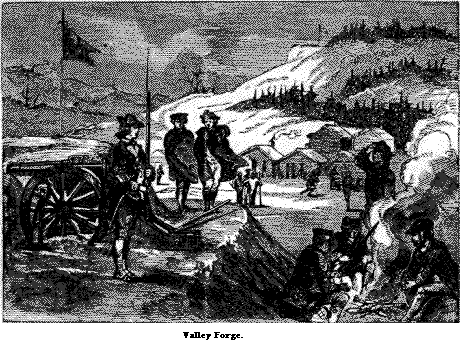
27. The
royalists passed the winter in the enjoyment of all that an
opulent city could afford. Not so with the patriots. Rude huts
were their only shelter; they were often destitute of food,
without blankets for the night, without sufficient clothing, and
marking with blood, from their naked feet, their marches over ice,
and snow, and frozen ground.1
28. While Washington was
struggling against every obstacle to keep his army together,
through the gloomy winter, at Valley Forge, an intrigue was set on
foot to remove him from the chief command. This is known its the
Conway cabal, from Conway, an adventurer, who was prominent
in it. The reverses of the army under Washington were contrasted
with the brilliant success of Gates, who himself was not unwilling
to supplant his superior. When this became known, so great was the
storm of indignation that burst forth from the army, the state
legislatures, and from the people, that the instigators of the
movement cowered, ashamed or afraid to acknowledge the part they
had taken in it.
1 Washington wrote. from Valley Forge, "Without arrogance, or the smallest deviation from truth, it may be said that no history, now extant, can furnish an instance of an army suffering such hardships as ours has done, bearing them with the same patience and fortitude."
QUESTIONS. -- 26. Where did Washington take up his winter quarters? 27. What is said of the condition of the royalists and the patriots during the winter? 28. Give an account of the Conway cabal.
|
130 |
|
29. A naval
exploit of this year deserves mention. Captain Wickes, with
three ships made a cruise 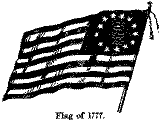 round
Ireland, and swept from the British waters their merchantmen. On
his way to America, one of his ships was captured; and on the
coast of Newfoundland, Wickes, with all his crew, was lost. The
American flag,1 a circle of thirteen stars on a
blue ground and thirteen alternating red and white stripes, first
floated from the mast-head on Wickes's cruise. From the earliest
period of the war American privateers proved a serious injury to
English commerce. Before the close of the year 1777 more
than eight hundred prizes had been captured by
American cruisers. The Congress of 1775 appointed a marine
committee, and began a navy. Esek Hopkins, usually styled
commodore, was its first commander.
round
Ireland, and swept from the British waters their merchantmen. On
his way to America, one of his ships was captured; and on the
coast of Newfoundland, Wickes, with all his crew, was lost. The
American flag,1 a circle of thirteen stars on a
blue ground and thirteen alternating red and white stripes, first
floated from the mast-head on Wickes's cruise. From the earliest
period of the war American privateers proved a serious injury to
English commerce. Before the close of the year 1777 more
than eight hundred prizes had been captured by
American cruisers. The Congress of 1775 appointed a marine
committee, and began a navy. Esek Hopkins, usually styled
commodore, was its first commander.
30. Events of 1778. -- The effects of the
capture of Burgoyne's army were not less important in Europe than
in America. The British government now made overtures to
the colonies for conciliation, but they were rejected.
A minority in Parliament had always
opposed the violent measures of the government in relation to
America. News of the defeat of Burgoyne wrought a change in the
views of the majority, so far that Lord North brought forward
Conciliatory Bills, which speedily passed, and which
conceded all that had been asked before the beginning of the war.
But these bills did not concede what America now demanded, namely,
independence; and the attempt at reconciliation came to
naught.
31. Burgoyne's surrender led France,
February 6, to acknowledge the independence of the United States,
and enter into treaties of alliance and commerce with the infant
republic.
I The union of St. George's cross, the old flag of England (a red cross on a white ground), and St.
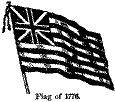
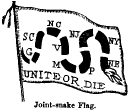 Andrew's
cross, the old flag of Scotland (a white cross on a blue ground),
gave the union flag of Great Britain. In January. 1776, a flag was
raised over the patriot camp about Boston, having thirteen
stripes, with the union of Great Britain. But it was not thought
proper to keep the British union after the declaration of
independence, and, in the summer of 1777, the flag described above
was adopted. After the close of the war, when new states came to
be added, it was decided to add a star for each new state, and,
lest the circle should become too large, to arrange the stars in
the form of one large five-pointed star. Other arrangements of
stars are now generally adopted. Before the war, and during its
earlier stages, various devices served to distinguish those who
espoused the patriot cause. The troops sometimes fought under the
flags of the different states. While the idea of union was taking
hold of the public mind, a favorite device was that of the joint
snake -- each joint hearing the name of some part of the
country.
Andrew's
cross, the old flag of Scotland (a white cross on a blue ground),
gave the union flag of Great Britain. In January. 1776, a flag was
raised over the patriot camp about Boston, having thirteen
stripes, with the union of Great Britain. But it was not thought
proper to keep the British union after the declaration of
independence, and, in the summer of 1777, the flag described above
was adopted. After the close of the war, when new states came to
be added, it was decided to add a star for each new state, and,
lest the circle should become too large, to arrange the stars in
the form of one large five-pointed star. Other arrangements of
stars are now generally adopted. Before the war, and during its
earlier stages, various devices served to distinguish those who
espoused the patriot cause. The troops sometimes fought under the
flags of the different states. While the idea of union was taking
hold of the public mind, a favorite device was that of the joint
snake -- each joint hearing the name of some part of the
country.QUESTIONS -- 29. What naval exploit of this year? What is said of the American flag? Of American privateers and cruisers? Of the beginning of a navy? 30. What is said of the effect in Europe of Burgoyne's surrender? What did the British government do? -- What can you tell of Conciliatory Bills? 31. What was the effect in France of Burgoyne's surrender?
|
|
131 |
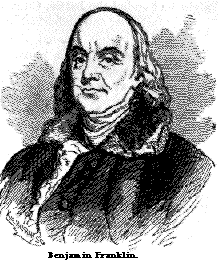 Early
in 1776, Silas Deane, of Connecticut, was sent to France as a
commercial and political agent, to procure supplies of arms and
military stores, and to ascertain the disposition of the French
court in regard to the contest between Great Britain and the
colonies. Later in the year Congress appointed Benjamin Franklin,
Mr. Deane, and Arthur Lee as commissioners to negotiate a
treaty with the French government.1 Franklin was
untiring in his efforts to obtain the recognition of American
independence, and his services were of the highest value. His
reputation as a philosopher, and his agreeable social qualities,
gained him the respect and esteem of the best minds in the French
capital.2 Though the French government secretly favored
the Americans, allowing arms to be taken from the public arsenals,
and prizes taken by American privateers to be sold in French and
West India ports, yet, before the capture of Burgoyne, the success
of the conflict was too doubtful for France to risk embroiling
herself in a war with her old enemy, Great Britain, by open
intervention. Without the assistance of France in money, ships,
and troops, and more than all, without her moral support, the
United States would have succeeded, if at all, only after it
struggle greatly prolonged.
Early
in 1776, Silas Deane, of Connecticut, was sent to France as a
commercial and political agent, to procure supplies of arms and
military stores, and to ascertain the disposition of the French
court in regard to the contest between Great Britain and the
colonies. Later in the year Congress appointed Benjamin Franklin,
Mr. Deane, and Arthur Lee as commissioners to negotiate a
treaty with the French government.1 Franklin was
untiring in his efforts to obtain the recognition of American
independence, and his services were of the highest value. His
reputation as a philosopher, and his agreeable social qualities,
gained him the respect and esteem of the best minds in the French
capital.2 Though the French government secretly favored
the Americans, allowing arms to be taken from the public arsenals,
and prizes taken by American privateers to be sold in French and
West India ports, yet, before the capture of Burgoyne, the success
of the conflict was too doubtful for France to risk embroiling
herself in a war with her old enemy, Great Britain, by open
intervention. Without the assistance of France in money, ships,
and troops, and more than all, without her moral support, the
United States would have succeeded, if at all, only after it
struggle greatly prolonged.
32. The effect of this alliance was
immediately apparent. The British, under command of Sir Henry
Clinton, who had succeeded General Howe,3 evacuated
Philadelphia,4 June 18, and crossed into New Jersey,
intending to concentrate the royal forces at New York before the
arrival of the expected armament from France. Washington pursued
and overtook the retreating foe at Monmouth Court-House, on
the morning of June 28. The English were so roughly handled, that,
after
1 John Adams took Deane's place, In April, 1778. Later in the year Congress dissolved the commission by appointing Franklin minister plenipotentiary to the court of France.
2 "Men imagined," says a celebrated French historian, "they saw in him a sage of antiquity come back to give austere lessons and generous examples to the moderns." See p.97, ¶ 6, and p. 162, ¶ 12, and note 1.
3 See p. 117, ¶ 16. 4 See p. 125, ¶ 16.
QUESTIONS. -- What agent was sent to France, and for what purpose? What commissioners were appointed, and for what purpose? What is said of Franklin? How had the French government favored the Americans? What is said of the importance of the assistance of France? 32. Who succeeded General Howe? When did Clinton evacuate Philadelphia? With what intention? Give an account of the Battle of Monmouth.
|
|
|
|
|
|
© 1999, 2000, 2001 for NEGenWeb Project by Ted & Carole Miller